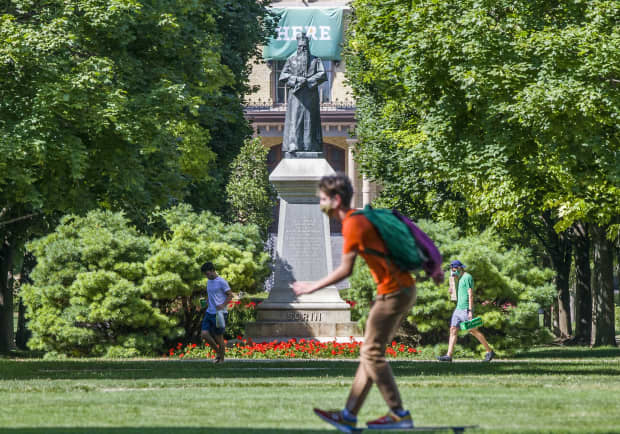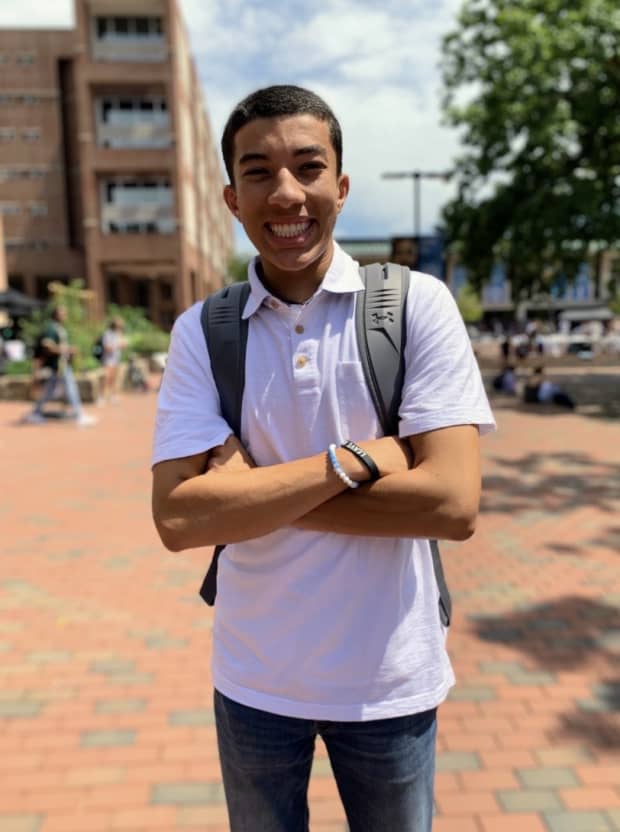This post was originally published on this site

University of Notre Dame is pivoting to remote classes for at least two weeks, following an outbreak of positive COVID cases. (Robert Franklin/South Bend Tribune via AP)
Robert Franklin/Associated Press
When the coronavirus pandemic first became a reality in March, colleges and universities across the country rushed to send students home.
Now students are once again suddenly packing their bags and preparing to take courses remotely, as the first few weeks of classes at many schools ushered in COVID outbreaks — except this time, colleges had months to prepare for a semester amid a global health emergency.
MarketWatch spoke to students at colleges that have already been impacted by COVID this semester. Two of these schools, the University of North Carolina Chapel Hill and the University of Notre Dame, have already experienced COVID outbreaks. After watching this scenario play out, Michigan State University officials announced Tuesday that they would hold classes remotely, just a few weeks before the start of the fall semester.
The decisions have disrupted students’ lives and plans. Here’s what they had to say about it.
Sarah Wietecha , senior at Michigan State University
Sarah Wietecha had already bought furniture for her off-campus apartment, begun packing up her room at her parents’ house and secured a job at a coffee shop in East Lansing, Mich., when she learned that her senior year classes at Michigan State University would be remote.
After initially planning to bring students back to campus, MSU’s president, Samuel Stanley, told families Tuesday that classes for undergraduates will be held online and that the bulk of students who were supposed to live in the residence halls will instead learn from home. The school is also encouraging students who were planning to live off-campus, like Wietecha, to consider staying where they’re currently living.
“Given the current status of the virus in our country — particularly what we are seeing at other institutions as they re-populate their campus communities — it has become evident to me that, despite our best efforts and strong planning, it is unlikely we can prevent widespread transmission of COVID-19 between students if our undergraduates return to campus,” Stanley wrote in his message.

Sarah Wietecha said she wished Michigan State University had made its decision to hold classes remotely earlier.
Wietecha agrees that the decision to hold classes remotely is the safest, but she wishes it would have been made with more time to mentally and practically prepare. “I could have told you in June that we were going to go online, we should have,” said Wietecha , 21.
Still, recent communications sent to students talking about testing and quarantining had made Wietecha hopeful that she would retain at least a small aspect of the in-person college experience. “As a theater major that was a big win for me,” given that performing arts courses are difficult to conduct online. “It would have been nicer to rip the Band-Aid off earlier, rather than a week before we all moved in,” she said.
Tuesday’s announcement, just a few weeks before classes were to start and a few days after tuition was due for many, “left a bad taste in my mouth,” she said. Ideally, Wietecha would like to see some kind of discount on tuition, particularly since under typical circumstances she would need to participate in performances to earn credit towards her major — something that’s impossible at the moment.
“Everyone is OK with that decision,” Wietecha said of MSU’s choice to move to remote instruction. But “I can’t afford to be paying or taking out thousands of dollars in loans to literally not be able to complete the classes we’re paying for.”
In addition to tuition, Wietecha will still be paying the lease for her off-campus apartment, which she signed months ago. “It’s a lot of money to break, if not impossible for a lot of other students,” Wietecha said. “They really put us in a rock and a hard place with this one.”
Students who were planning on living on campus but will now be living at home will receive refunds or credits for their on-campus room and board, Dan Olsen, an MSU spokesman, wrote in an email. While the school is encouraging students planning to live off campus to stay home, “we recognize that may not be an option for some,” Olsen wrote.
“We encourage them to work with their landlords to discuss their options,” he wrote.
Wietecha, her sister and their other roommate are planning on moving to East Lansing on Sunday when the lease on their apartment begins.
Mary Polking, junior at the University of Notre Dame
The roughly five minutes that Mary Polking spent watching Notre Dame’s president Rev. John Jenkins address students via video Tuesday evening was a roller coaster of emotions.
“There was this immediate sense of, I don’t want to say terror, but dread and then relief that we weren’t sent home,” Polking said. “We have this two week space where we have a chance to get things back on track.”
Jenkins announced that the school would be holding all undergraduate classes remotely for at least the next two weeks after what he described as a “dramatic increase” in positive COVID cases associated with the school. As of Wednesday, officials reported 222 positive cases out of 1,287 tests conducted since Aug. 3.
Since the address, in which Jenkins also said that only residents would be allowed in the dorms and that students living off-campus should stay off campus for the next two weeks, morale has been “depressingly low,” Polking said.
Some students are blaming each other for not abiding by public health guidelines — officials have said that many of the positive cases came from gatherings off-campus — while others are upset with the school’s administration, Polking said.
“It’s really just a lot of finger pointing,” she said. “I want to say it’s not productive, but there’s not really much productive stuff we can do right now.”
As of early afternoon on Wednesday, Polking said she hadn’t left her dorm room. In addition to pivoting to remote instruction, Jenkins announced that the school would close public spaces on campus. Clubs have cancelled in-person gatherings, Polking said. She doesn’t expect to be leaving her dorm much at all except to pick up grab-and-go meals from the dining hall, she said.
Though she was able to attend her Wednesday morning classes in her pajamas, Polking, a neuroscience major, said she’s disappointed that she’s now forced to study remotely. “Being in class is a better way to learn,” she said.
Last week, Polking said she’d been attending classes in person, wearing a mask and sitting several feet away from her fellow classmates while professors continued to broadcast the courses on Zoom ZM, -1.18% for those who didn’t feel comfortable coming in. Polking said she felt safe on campus and that classes seemed to be going pretty well.
But when she walked off campus a few days ago, Polking said she didn’t feel as comfortable. She saw fewer people wearing masks and they were Notre Dame students, Polking said.
“It’s pretty clear that the administration could have done more,” to prevent an outbreak, such as devoting more resources to testing and isolating students, Polking said. In a message on Tuesday following Jenkins’ announcement, officials said that the number of positive cases in the first week of classes “far exceeded our estimates,” and added that “we were not able to respond to all student calls in the personal way we pride ourselves on at Notre Dame.”
At the same time, it’s difficult to blame officials for the behavior of students who have acted selfishly by going out and partying, even if the administration should have anticipated that behavior, Polking said.
“There’s been a lot of student reaction on social media where so many people are just posting ‘wear a mask, stay home.’ Students are saying this is our one chance,” Polking said of activity following Jenkins’ address. “People are going to be more motivated not to go out and party, that’s my hope.”
If the school does decide to send students home as universities across the country did in March, Polking isn’t sure what she would do. She’d try to find a place to go other than back home to Charlotte, North Carolina.
“I love my family, they’re great, but I’d be sharing a room with at least one of my sisters,” she said. “My three-year-old sister really doesn’t understand what taking an exam means. If she decides to freak out or be a three-year-old, she’s going to do that and that’s really terrible for my concentration.”
Greear Webb, sophomore at University of North Carolina Chapel Hill
Though his college was planning to hold classes in person, Greear Webb decided in early August that he would be taking his fall semester courses online.
“My initial decisions were really just based on safety — my personal safety, the safety of my family and my peers,” said Webb, 19. “I just did not feel that UNC Chapel Hill had the necessary precautions to keep us safe.”
The school announced Monday that it would hold all undergraduate courses remotely after reporting multiple clusters of positive COVID cases in on and off-campus housing. When officials made the announcement Monday, 177 students were in isolation and 349 were in quarantine.

Greear Webb is a sophomore at UNC Chapel Hill, which decided to hold classes remotely after reporting multiple clusters of positive COVID cases.
Webb is co-chair of the political action committee of the school’s Black Student Movement and also serves on the Commission on Campus Equality and Student Equity, a group formed this summer to address concerns of racial, economic and educational equity at UNC. Webb said he and other student leaders have expressed concerns for months about the idea of returning to campus.
Employees were worried too. UNC Chapel Hill faculty wrote to students in early August asking them to stay home and a group of workers filed a lawsuit against the University of North Carolina system over its decision to hold classes in person, including at Chapel Hill, its flagship campus.
Webb said he’d expected that returning to Chapel Hill for in-person instruction and keeping students, faculty and staff safe would be difficult because “college is a place of congregating — that’s the whole purpose, to learn together.” That’s in part why he decided to start his sophomore year from home in Raleigh, North Carolina and why he and other student leaders warned about an in-person fall semester.
“I believed that the short-term sacrifice would be worth it,” Webb said because it would mean the community could move more quickly to seeing each other in person, safely. “The fact that we’re basically delaying that by waiting so late to make this decision to go online is really troubling and upsetting.”
Webb’s fellow students still in Chapel Hill are “scrambling” he said. The school has asked students living on campus to “make plans over the next week to return to their permanent home for the fall semester unless they are unable to do so,” even as class remains in session.
“I have many friends calling and texting and saying they’re anxious,” he said.


